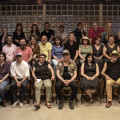To what extent do you consider the First Artsakh War to be sufficiently reflected in Armenian literature?
Literature is a direct reflection—whether considered horizontally or vertically, in-depth—of life. This is how the First Artsakh War is expressed in Armenian literature. The best piece is the book by Levon Khechoyan – Black Book, Heavy Bug. He fought in the war and presented it through his words – both the spirituality of victory and the terror of war. His story, The Tremor of the Soil expresses this the best.
Your generation bore witness to a war, victory, then another war, and defeat. How will all this be reflected in our literature, in your opinion, so that they can present the complete picture of these times in which we are living?
Given that the First Artsakh War ended in victory, even though it was a very difficult one, it was a heroic event. But that spirit of victory did not feed into our lives – it was lost even before this defeat. War itself is the defeat of goodness, but in order for good not to submit to evil, we must have strong borders – just like the ones between light and darkness, black and white, or even the ones separating the colors of the rainbow. I would like the truth about war, victory and defeat to be reflected by literature. Armenia has longer borders than the country’s size suggests and everything—including war, peace, victory and defeat—comes to the fore quickly. But our words need to grow denser before they can present the full picture of the times in which we are living.
What thoughts were born as a result of the Second Artsakh War and the defeat we suffered?
Thoughts heavy as lead, a constant aching of the mind…
If war breaks out at any location on the globe, the powers that enjoy warfare focus on that point. A country needs to be powerful, with strong borders, so that it can prevent wars from being waged for its land, especially in our case, given that we are surrounded by forces that have been trying to destroy our identity. The war on the country’s borders is probably a reflection of the contradictions that are prevailing within the state. This war showed us everything that has been taking place for centuries now, it revealed the reasons why only this small Armenia remains of what used to be Greater Armenia. If the Armenians are not the powerful leaders of their country, foreigners will cruelly distribute its pieces among themselves. It is important to work together with powerful and peace-loving states. Otherwise, we will keep looking for the causes of our defeat, blaming other states and circumstances.
The third article of the PEN Charter mentions peace, good understanding between nations, and respect. How realistic is this after the war?
An organization like PEN, which has representations in different countries of the world, can facilitate the establishment of true mutual understanding and respect between nations. But that does not mean that writers writing in different languages should be indifferent when it comes to the occupation of the Holy All-Savior Church in Shushi or the conversion to a mosque of the Aya Sofia in Istanbul. On the contrary, they must stand in opposition to destruction. Peace is realistic only to the extent to which humanitarianism can defeat barbarity. In order to force peace in the world, you need more strength than you would to win a war. One Armenian soldier, who used his only bottle of water to plant a new sapling in deserted land, stands facing a whole army or a swarm of drones, which rain white phosphorus down on forests, razing them to the ground. This is the reality of war of peace.
What role can a writer’s words and text play in reconciliation and peacebuilding initiatives between nations?
Writers’ words should always be directed at peace. If writers that write in all languages produce words that are so peaceful that the nations born and bred on this literature live in peace, there would be no wars. Every day in this world, one person kills another, and wars have been waged throughout time. But, nonetheless, if there is any point in a war where a soldier prepares to kill a foreign child or girl standing in front of him, a writer should stand between the soldier and the victim he is about to kill, preventing the shot from being taken.



